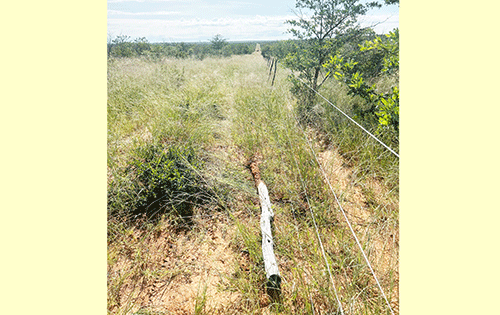Zebaldt Ngaruka
EPUKIRO – Following the commencement of the removal of illegal fences in the Otjinene constituency’s Ondorozu village in Omaheke region, the chairperson of the Omaheke Communal Land board Elias Tutu Muundjua advises communities to cooperate with relevant authorities on the ground during the exercise.
The then-Ministry of Agriculture, Water and Land Reform (MAWLR) last month commenced with the removal of illegal fences in parts of Omaheke and Otjozondjupa regions.
The National Youth Service (NYS) is contracted by the agriculture ministry with the removal of illegal fences countrywide.
Speaking to New Era, Muundjua said the removal process is in line with the law, and aimed at giving equal opportunities to the rural communities to share land.
“The law is very clear on the matter. Those who are affected by the removal process were given legal notices to remove their fences themselves, but refused to do so. Thus, the government is acting now, “ he said.
He said the communities must always work together and share the land instead of resorting to disputes.
“We have policies in place on how the land in communal areas or settings must be governed. The communities must acquaint themselves with policies in place to avoid unnecessary loss of structures and properties,” he said.
Muundja also shared with this publication that more than 50 cases of illegal fences have been reported in Omaheke. Six cases are ready, and fences will be removed during this process.
“We have on numerous occasions advised the communities to apply for land rights before building structures, but our advice was in vain,” he said, adding that the land board is only allowed to give a maximum of 50 hectares to land applicants.
Muundjua added that only the executive director of the MAWLR can give more than 50 hectares to applicants.
“There is no way a traditional authority or communal land board members can issue land beyond allocated 50 hectares,” he said.
He further advised community’s members served with removal notices to remove fences by themselves, instead of waiting for the NYS trainees to come.
Meanwhile, NYS project supervisor Jonas Potilo Kambonde urged the communities in the affected areas to cooperate with the authority during the removal process.
“We are not doing this on our own. We are mandated by the agriculture ministry. These trainees are acting on behalf of the Ministry and don’t interfere with their work,” he said.
Stakeholders such as Namibian Police, traditional authorities and land board officials are monitoring the removal process of all illegal fences.
Similar removal exercises were conducted in the northern regions, and will continue countrywide. -zngaruka@yahoo.com


